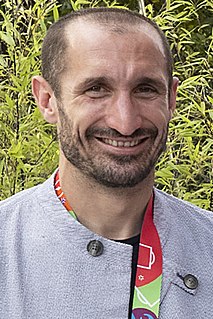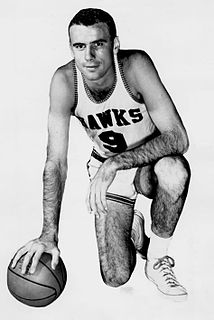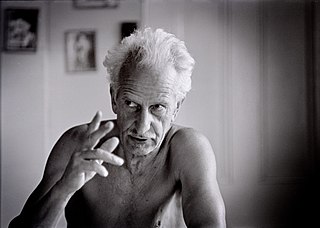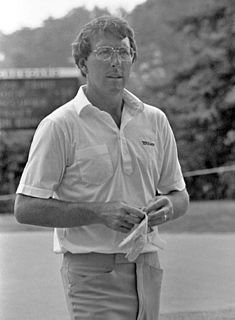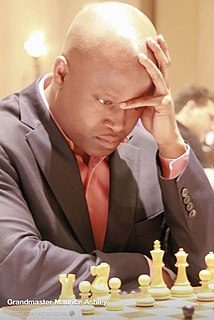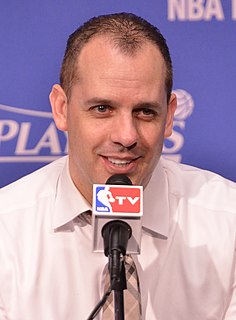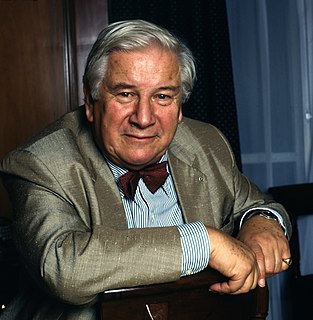A Quote by Giorgio Chiellini
Knowing your opponent is fundamental. Because then you can know their characteristics better.
Quote Topics
Related Quotes
Fear comes from uncertainty; we can eliminate the fear within us when we know ourselves better. As the great Sun Tzu said: “When you know yourself and your opponent, you will win every time. When you know yourself but not your opponent, you will win one and lose one. However, when you do not know yourself or your opponent, you will be imperiled every time.
When you go out on the court whether it be for the championship or just a scrimmage, have confidence that your abilities and what you've learned in your drills are better than your opponent's. This does not mean you should disregard your opponent. Before taking the court for any game, you should do a lot of thinking about what you have to do to beat your opponent and what he must or can do to beat you.
Meditation is a journey to know yourself. Knowing yourself has many layers. Start knowing your bodily discomforts. Know your success, know your failures. Know your fears. Know your irritations. Know your pleasures, joy and happiness. Know your mental wounds. Go deeper and examine every feeling you have.
I have found life highly competitive. I accept it. It is useless, merely a hypocritical humbug, to sincerely wish your opponent to win. If you are out to win you are better not wanting to know your opponent, much less grow to like him - and wish him, honestly success over you. I have never functioned that way.
Knowing your opponent is a crucial part of emulating and defeating that opponent. But scouting is only the first step. Too many leaders spend countless hours studying an opponent's every move in the search for an edge. The Great Teams understand not only how to scout but also how to exploit the weaknesses of a competitor. These teams analyze every perspective and option and position themselves to take full advantage of any knowledge gained about an opponent.
These are the only two situations possible, and you are in the sad situation. Everybody may know about you - who you are - but you yourself are completely oblivious of your transcendence, of your real nature, of your authentic being. This is the only sadness in life. You can find many excuses, but the real sadness is this: you don't know who you are. How can a person be happy not knowing who he is, not knowing from where he comes, not knowing where he is going? A thousand and one problems arise because of this basic self-ignorance.
The difference between fear and panic is knowing what to do. If you have a reliable, effective solution then fear is an asset. You know what to do and fear just makes you do it faster. On the other hand, if you don't know what to do - or don't trust what you know - then you will freeze in terror, because you have no clear goal or way to get there. Fear helps, panic hinders. Fear is your savior, panic your nemesis.
Get to know yourself. Know your own failings, passions, and prejudices so you can separate them from what you see. Know also when you actually have thought through to the nature of the thing with which you are dealing and when you are not thinking at all... Knowing yourself and knowing the facts, you can judge whether you can change the situation so it is more to your liking. If you cannot--or if you do not know how to improve on things--then discipline yourself to the adjustments that will be necessary.
I don't like getting hit for one, although you know I did take Aikido for many years, but Aikido is a different kind of martial art, maybe even a more cerebral art because it's all about redirecting the energies of your opponent instead of trying to bash your opponent's head in effectively, so it's a much more loving art, so I guess I tend that way normally anyway.
The film room teaches you how to do the job, how to study the game, how to teach the game from film. How to create an advantage for your team by knowing your opponent, and all their plays and tendencies. And there's no better guy in the world that I've been around than Jim O'Brien at breaking down film.
When you're writing a blog post, you can take solace in knowing that you will immediately know how people will respond to it, and if the criticism is bad, then that's fine because you can work on that and fix it, and if it's good, then that's great because you know what to do in the future. It gets pushed down so quickly.
